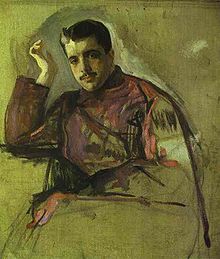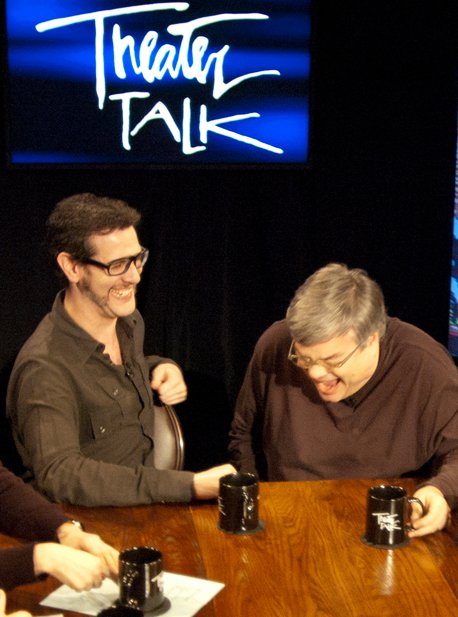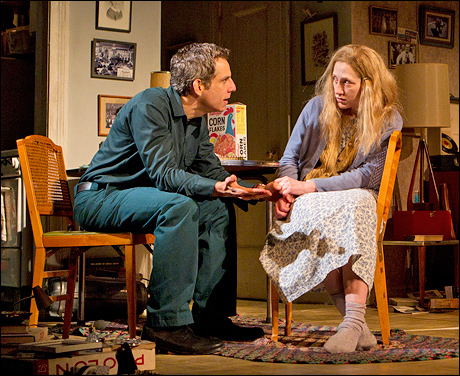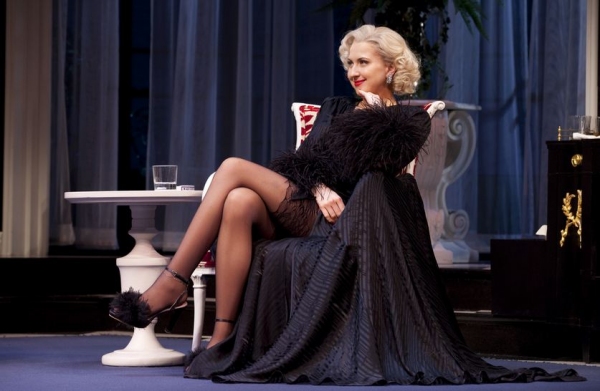“For I consider that music is, by its very nature, essentially powerless to express anything at all, whether a feeling, an attitude of mind, a psychological mood, a phenomenon of nature, etc. Expression has never been an inherent property of music. That is by no means the purpose of its existence. If, as is nearly always the case, music appears to express something, this is only an illusion and not a reality. It is simply an additional attribute which, by tacit and inveterate agreement, we have lent it, thrust upon it, as a label, a convention-in short, an aspect which, unconsciously or by force of habit, we have come to confuse with its essential being.”
Igor Stravinsky, An Autobiography
Archives for 2011
TT: And one to go
A little later today I’ll be heading down to Philadelphia for the final dress rehearsal of Danse Russe. Things have been going very well all week long, and Paul Moravec and I expect Thursday’s premiere to go at least as well, if not better. That’s a wonderful feeling–and a reassuring one. Anybody who tells you that a bad dress rehearsal means a good opening night knows nothing about theater.
The experience of bringing my second opera to the stage has been quite different from that of rehearsing The Letter in Santa Fe two years ago. The Letter opened in July, and I took a full month off from my day job at The Wall Street Journal to attend rehearsals (though I only skipped a single drama column–I saw several long-running summer festival shows before flying out to Santa Fe and reviewed them while I was there).
Danse Russe, by contrast, went into rehearsal at the height of the busiest Broadway season in years, and there was no way that I could escape to Philadelphia until I’d seen all the shows I had to see. I went to five previews in a row last week, two of them on Saturday. (Seeing two musicals in one day is not a good idea, Mrs. Worthington.) Then, on Monday, I got up at seven in the morning and spent nine hours writing three Wall Street Journal drama columns, after which I took the next train to Philadelphia, arriving just in time for the piano dress of Danse Russe. It was the first time that I’d seen the entire piece performed on stage from start to finish, and I was so busy scrawling down notes for the singers that I barely had time to register the impact of seeing it.
 Only once was I fully present in the emotional moment, and that was when I heard the new aria for Sergei Diaghilev that Paul and I wrote a couple of months ago after seeing a workshop performance of the next-to-last draft of Danse Russe. Paul had called me from Philadelphia on Saturday to tell me that the aria really worked, but I had to take his word for it: I’d never heard it sung, only “played” in a synthesized version on my laptop. Hearing and seeing my words sung from the stage bowled me over–though not for long. The rehearsal continued, and in mere seconds I was caught up once more in the controlled frenzy that is a dress rehearsal.
Only once was I fully present in the emotional moment, and that was when I heard the new aria for Sergei Diaghilev that Paul and I wrote a couple of months ago after seeing a workshop performance of the next-to-last draft of Danse Russe. Paul had called me from Philadelphia on Saturday to tell me that the aria really worked, but I had to take his word for it: I’d never heard it sung, only “played” in a synthesized version on my laptop. Hearing and seeing my words sung from the stage bowled me over–though not for long. The rehearsal continued, and in mere seconds I was caught up once more in the controlled frenzy that is a dress rehearsal.
On the train to New York that night, I thought of the scene from Bull Durham in which Tim Robbins, the hot young rookie pitcher, trots proudly into the dugout after pitching a fantastic inning. He says, “I was great, huh?” But Kevin Costner, the veteran catcher who’s trying to prepare him for the big leagues, isn’t having any of it. He says, “Your fastball was up and your curveball was hanging. In the show they would’ve ripped you.” Robbins asks, “Can’t you let me enjoy the moment?” And Costner replies, “The moment’s over.”
That’s the way it goes, at least in my experience. Not until Thursday’s premiere will I be able to savor Danse Russe, and even then I’ll probably be so preoccupied with the nuts and bolts of the performance that I won’t really experience it. If I’m lucky, I’ll be able to relax on Friday and Saturday and see the show the way the audience sees it. Or not. After all, it isn’t my job to enjoy Danse Russe. That’s your job, should you feel so moved. My job is to help make it all happen. Pleasure is optional–for now.
* * *
Danse Russe opens on Thursday at Philadelphia’s Kimmel Center for the Performing Arts. For more information, go here.
TT: Apropos of Danse Russe (III)
Igor Stravinsky conducts the Toronto Symphony in a 1967 rehearsal for a performance of his Pulcinella Suite. Stravinsky composed the score for The Rite of Spring in 1913 and is a character in Danse Russe:
TT: Almanac
“My music is best understood by children and animals.”
Igor Stravinsky (quoted in The Observer, Oct. 8, 1961)
TT: Present laughter
 Adam Feldman, the drama critic of Time Out New York, sent me this snapshot taken on the set of CUNY-TV’s Theater Talk, where I taped an episode last week that will air later this month. In addition to Adam and me, the panel included Jacques le Sourd and Elisabeth Vincentelli. As you can see, we had a lot of fun talking about the Broadway season just past.
Adam Feldman, the drama critic of Time Out New York, sent me this snapshot taken on the set of CUNY-TV’s Theater Talk, where I taped an episode last week that will air later this month. In addition to Adam and me, the panel included Jacques le Sourd and Elisabeth Vincentelli. As you can see, we had a lot of fun talking about the Broadway season just past.
Critics can, needless to say, be sour souls–especially when they see a bunch of bad shows in a row–but I thought it might possibly amuse you to see how amused the two of us look. I only wish I knew what I was laughing at!
TT: A blacker shade of blue
In today’s Wall Street Journal I review two major revivals, The House of Blue Leaves and Born Yesterday. Here’s an excerpt.
* * *
 It’s dauntingly difficult to bring off John Guare’s “The House of Blue Leaves,” which may explain why this modern masterpiece, first performed in 1966, hasn’t been seen on Broadway since 1987. The trick is in the tone. “The House of Blue Leaves” is a comedy about hopelessness, and it plays like “You Can’t Take It With You” rewritten by Eugène Ionesco: It won’t work if it isn’t zany, and it won’t work if it isn’t horrifically disturbing. Fortunately, David Cromer has cracked Mr. Guare’s complex code with the effortless understanding that he brings to every show he stages. The result is a production in which three big names–Ben Stiller, Edie Falco and Jennifer Jason Leigh–are presented not as flop insurance but as artists, and in which full justice is done to one of the best American plays of the 20th century.
It’s dauntingly difficult to bring off John Guare’s “The House of Blue Leaves,” which may explain why this modern masterpiece, first performed in 1966, hasn’t been seen on Broadway since 1987. The trick is in the tone. “The House of Blue Leaves” is a comedy about hopelessness, and it plays like “You Can’t Take It With You” rewritten by Eugène Ionesco: It won’t work if it isn’t zany, and it won’t work if it isn’t horrifically disturbing. Fortunately, David Cromer has cracked Mr. Guare’s complex code with the effortless understanding that he brings to every show he stages. The result is a production in which three big names–Ben Stiller, Edie Falco and Jennifer Jason Leigh–are presented not as flop insurance but as artists, and in which full justice is done to one of the best American plays of the 20th century.
If you leave out the loony parts, “The House of Blue Leaves” sounds like a kitchen-sink tragedy, the story of a frustrated songwriter (Mr. Stiller) who is married to a schizophrenic (Ms. Falco) and who falls in love with his downstairs neighbor (Ms. Leigh). But Mr. Guare confounds all expectations by making Artie Shaughnessy a bad songwriter (he pays the rent by working in a zoo) and superimposing atop his painful plight a high-speed screwball-comedy plot involving three nuns and a deaf starlet (Alison Pill). Yet you are always aware of the excruciating agony of Artie and his demented wife, and though much of “The House of Blue Leaves” is wildly funny, there is no forgetting that it is a “farce” in which innocent people die.
Mr. Cromer, as is his wont, has directed “The House of Blue Leaves” for truth, not comedy, letting the humor come of its own accord (and come it does, especially in the second act) rather than forcing it off the page. As a result, much of the laughter is audibly uncomfortable, and when the terrible last scene has played itself out to the bitter end, you go home feeling stunned and drained…
 The sound that you’re hearing at the Cort Theatre these days is one of the rarest in the world: It’s the collective purr of an audience falling in love with a brand-new face. Nina Arianda made a huge impression on everyone who saw her make her professional stage debut last year in the Off-Broadway premiere of David Ives’ “Venus in Fur.” Now she’s playing the not-so-dumb-blonde in a Broadway revival of Garson Kanin’s “Born Yesterday,” the play that put Judy Holliday on the map in 1946 and is going to do the same thing for Ms. Arianda. Ms. Arianda is a charismatic comedienne who is as funny as she is sexy, and anyone capable of resisting her charms is both blind and deaf….
The sound that you’re hearing at the Cort Theatre these days is one of the rarest in the world: It’s the collective purr of an audience falling in love with a brand-new face. Nina Arianda made a huge impression on everyone who saw her make her professional stage debut last year in the Off-Broadway premiere of David Ives’ “Venus in Fur.” Now she’s playing the not-so-dumb-blonde in a Broadway revival of Garson Kanin’s “Born Yesterday,” the play that put Judy Holliday on the map in 1946 and is going to do the same thing for Ms. Arianda. Ms. Arianda is a charismatic comedienne who is as funny as she is sexy, and anyone capable of resisting her charms is both blind and deaf….
* * *
Read the whole thing here.
Nina Arianda appears in a trailer for the premiere of David Ives’ Venus in Fur:
TT: Apropos of Danse Russe (II)
From Fantasia, the opening of Walt Disney’s animated interpretation of The Rite of Spring, with the music performed by Leopold Stokowski and the Philadelphia Orchestra:
TT: Almanac
“The trouble with music appreciation in general is that people are taught to have too much respect for music; they should be taught to love it instead.”
Igor Stravinsky, “Subject: Music,” (New York Times Magazine, Sept. 27, 1964)
